Business Environment of Halifax Bank Clients: A Detailed Report
VerifiedAdded on 2020/12/09
|10
|2887
|142
Report
AI Summary
This report provides a comprehensive analysis of the business environment, focusing on Halifax Bank and its clients. It begins with an introduction to the business environment and explores different types of organizations, including sole traders, partnerships, limited companies, public limited companies, and charitable organizations. The report then delves into the organizational structures of Halifax Bank clients, such as matrix and divisional structures, and examines how these structures relate to the company's objectives. A case study of Debenhams, a client of Halifax Bank, is presented, analyzing the positive and negative impacts of the macro environment (political, economic, social, technological, environmental, and legal factors) on its business operations. Finally, a SWOT analysis of Debenhams is conducted, highlighting its strengths, weaknesses, opportunities, and threats, and exploring the interrelation of these factors with the external macro environment. The report provides insights into the challenges and opportunities faced by businesses operating in the UK market.
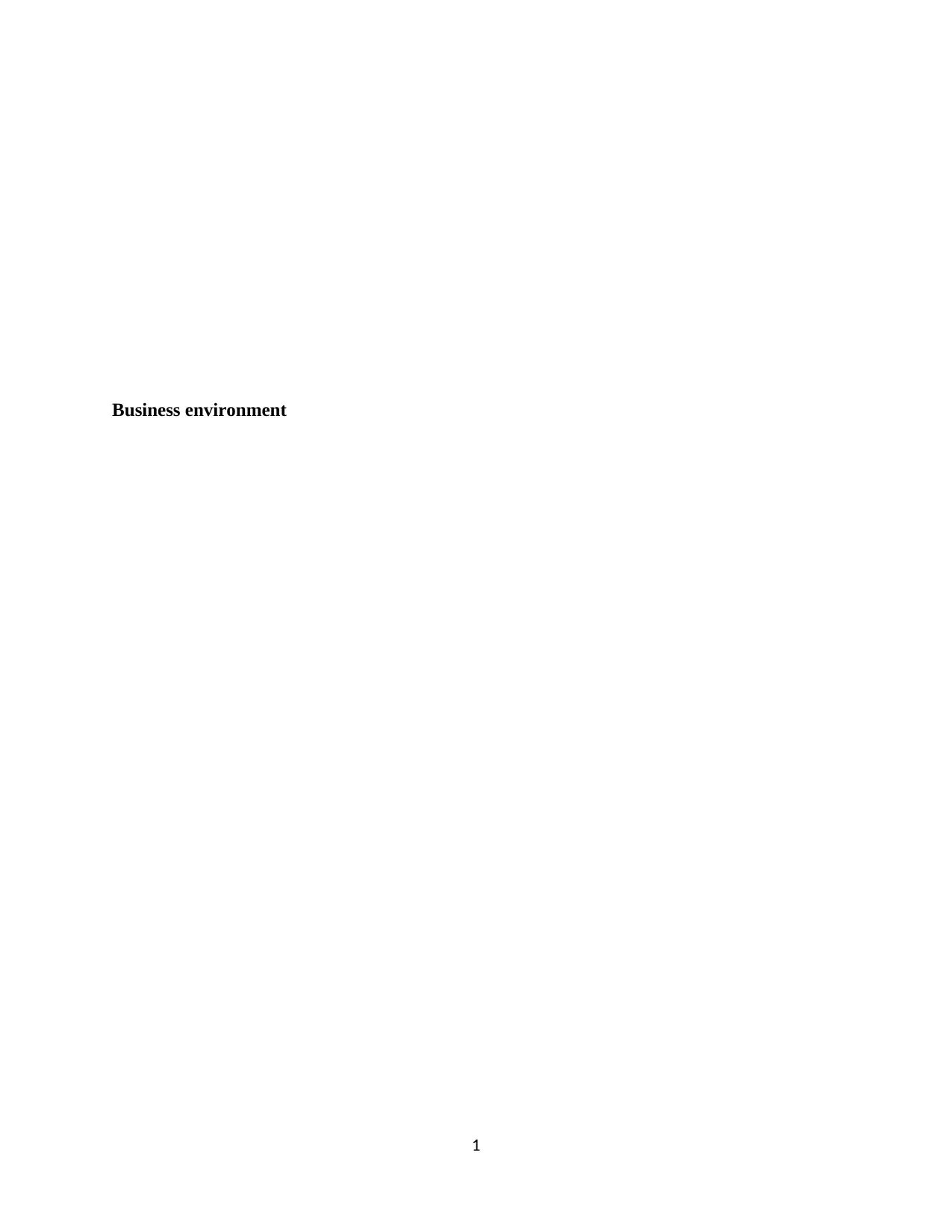
Business environment
1
1
Paraphrase This Document
Need a fresh take? Get an instant paraphrase of this document with our AI Paraphraser
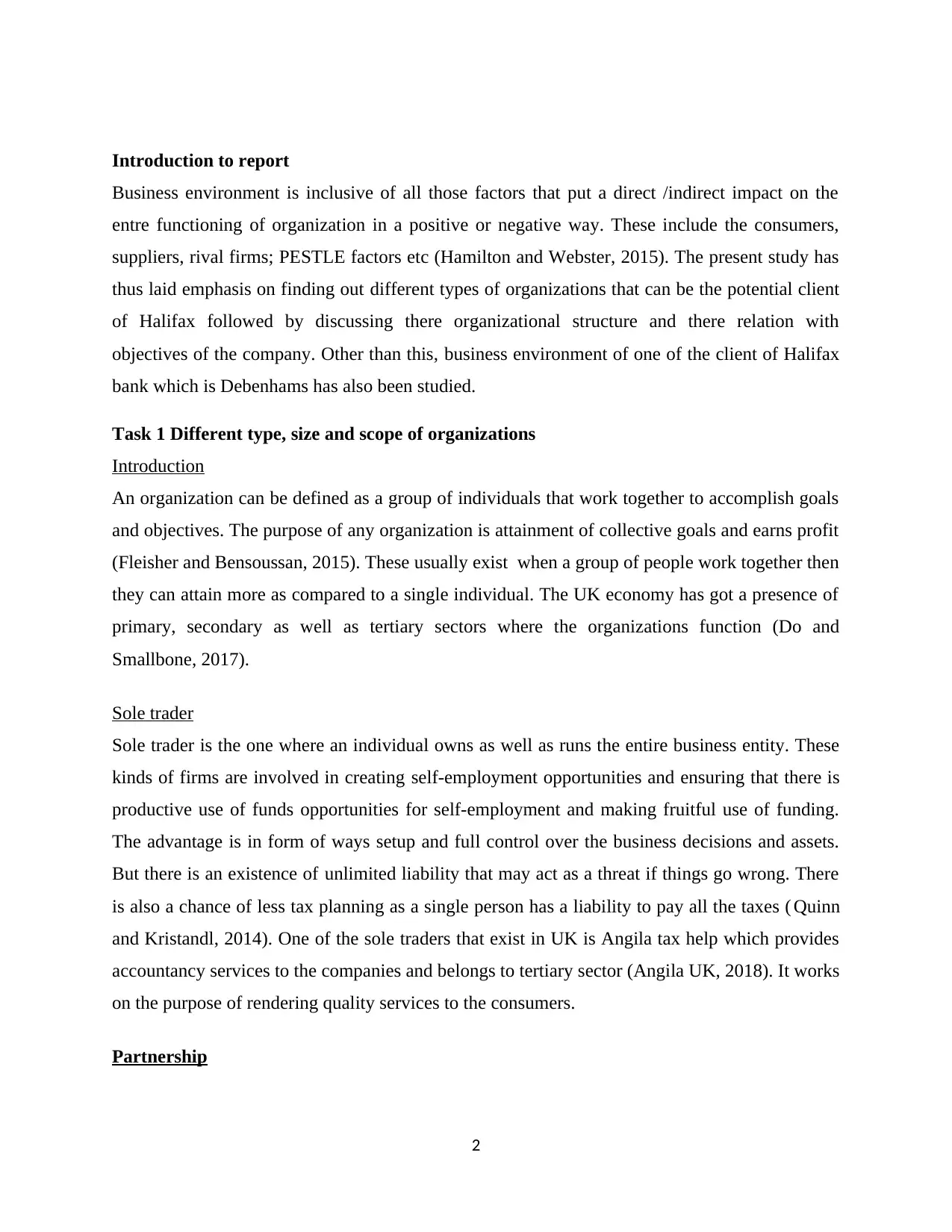
Introduction to report
Business environment is inclusive of all those factors that put a direct /indirect impact on the
entre functioning of organization in a positive or negative way. These include the consumers,
suppliers, rival firms; PESTLE factors etc (Hamilton and Webster, 2015). The present study has
thus laid emphasis on finding out different types of organizations that can be the potential client
of Halifax followed by discussing there organizational structure and there relation with
objectives of the company. Other than this, business environment of one of the client of Halifax
bank which is Debenhams has also been studied.
Task 1 Different type, size and scope of organizations
Introduction
An organization can be defined as a group of individuals that work together to accomplish goals
and objectives. The purpose of any organization is attainment of collective goals and earns profit
(Fleisher and Bensoussan, 2015). These usually exist when a group of people work together then
they can attain more as compared to a single individual. The UK economy has got a presence of
primary, secondary as well as tertiary sectors where the organizations function (Do and
Smallbone, 2017).
Sole trader
Sole trader is the one where an individual owns as well as runs the entire business entity. These
kinds of firms are involved in creating self-employment opportunities and ensuring that there is
productive use of funds opportunities for self-employment and making fruitful use of funding.
The advantage is in form of ways setup and full control over the business decisions and assets.
But there is an existence of unlimited liability that may act as a threat if things go wrong. There
is also a chance of less tax planning as a single person has a liability to pay all the taxes ( Quinn
and Kristandl, 2014). One of the sole traders that exist in UK is Angila tax help which provides
accountancy services to the companies and belongs to tertiary sector (Angila UK, 2018). It works
on the purpose of rendering quality services to the consumers.
Partnership
2
Business environment is inclusive of all those factors that put a direct /indirect impact on the
entre functioning of organization in a positive or negative way. These include the consumers,
suppliers, rival firms; PESTLE factors etc (Hamilton and Webster, 2015). The present study has
thus laid emphasis on finding out different types of organizations that can be the potential client
of Halifax followed by discussing there organizational structure and there relation with
objectives of the company. Other than this, business environment of one of the client of Halifax
bank which is Debenhams has also been studied.
Task 1 Different type, size and scope of organizations
Introduction
An organization can be defined as a group of individuals that work together to accomplish goals
and objectives. The purpose of any organization is attainment of collective goals and earns profit
(Fleisher and Bensoussan, 2015). These usually exist when a group of people work together then
they can attain more as compared to a single individual. The UK economy has got a presence of
primary, secondary as well as tertiary sectors where the organizations function (Do and
Smallbone, 2017).
Sole trader
Sole trader is the one where an individual owns as well as runs the entire business entity. These
kinds of firms are involved in creating self-employment opportunities and ensuring that there is
productive use of funds opportunities for self-employment and making fruitful use of funding.
The advantage is in form of ways setup and full control over the business decisions and assets.
But there is an existence of unlimited liability that may act as a threat if things go wrong. There
is also a chance of less tax planning as a single person has a liability to pay all the taxes ( Quinn
and Kristandl, 2014). One of the sole traders that exist in UK is Angila tax help which provides
accountancy services to the companies and belongs to tertiary sector (Angila UK, 2018). It works
on the purpose of rendering quality services to the consumers.
Partnership
2
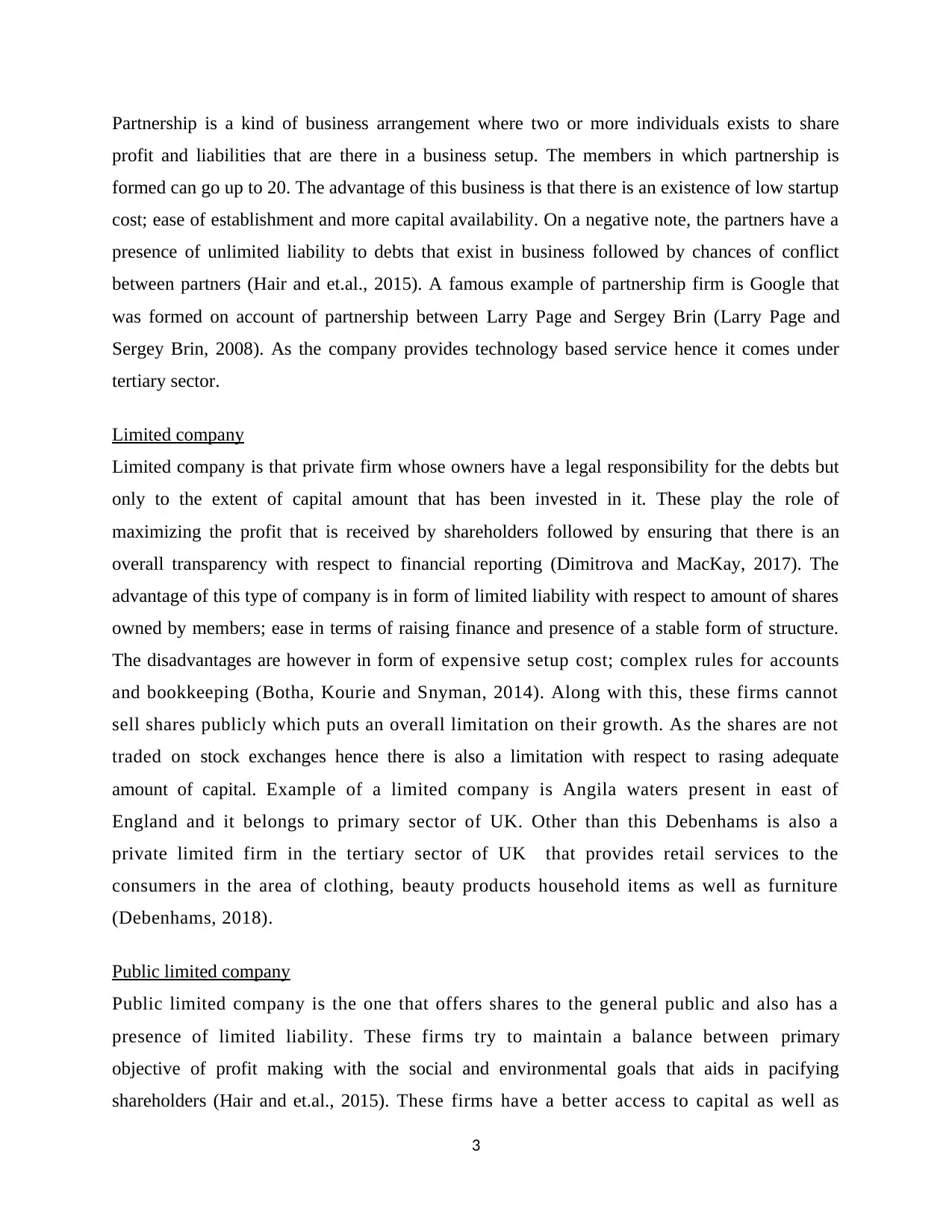
Partnership is a kind of business arrangement where two or more individuals exists to share
profit and liabilities that are there in a business setup. The members in which partnership is
formed can go up to 20. The advantage of this business is that there is an existence of low startup
cost; ease of establishment and more capital availability. On a negative note, the partners have a
presence of unlimited liability to debts that exist in business followed by chances of conflict
between partners (Hair and et.al., 2015). A famous example of partnership firm is Google that
was formed on account of partnership between Larry Page and Sergey Brin (Larry Page and
Sergey Brin, 2008). As the company provides technology based service hence it comes under
tertiary sector.
Limited company
Limited company is that private firm whose owners have a legal responsibility for the debts but
only to the extent of capital amount that has been invested in it. These play the role of
maximizing the profit that is received by shareholders followed by ensuring that there is an
overall transparency with respect to financial reporting (Dimitrova and MacKay, 2017). The
advantage of this type of company is in form of limited liability with respect to amount of shares
owned by members; ease in terms of raising finance and presence of a stable form of structure.
The disadvantages are however in form of expensive setup cost; complex rules for accounts
and bookkeeping (Botha, Kourie and Snyman, 2014). Along with this, these firms cannot
sell shares publicly which puts an overall limitation on their growth. As the shares are not
traded on stock exchanges hence there is also a limitation with respect to rasing adequate
amount of capital. Example of a limited company is Angila waters present in east of
England and it belongs to primary sector of UK. Other than this Debenhams is also a
private limited firm in the tertiary sector of UK that provides retail services to the
consumers in the area of clothing, beauty products household items as well as furniture
(Debenhams, 2018).
Public limited company
Public limited company is the one that offers shares to the general public and also has a
presence of limited liability. These firms try to maintain a balance between primary
objective of profit making with the social and environmental goals that aids in pacifying
shareholders (Hair and et.al., 2015). These firms have a better access to capital as well as
3
profit and liabilities that are there in a business setup. The members in which partnership is
formed can go up to 20. The advantage of this business is that there is an existence of low startup
cost; ease of establishment and more capital availability. On a negative note, the partners have a
presence of unlimited liability to debts that exist in business followed by chances of conflict
between partners (Hair and et.al., 2015). A famous example of partnership firm is Google that
was formed on account of partnership between Larry Page and Sergey Brin (Larry Page and
Sergey Brin, 2008). As the company provides technology based service hence it comes under
tertiary sector.
Limited company
Limited company is that private firm whose owners have a legal responsibility for the debts but
only to the extent of capital amount that has been invested in it. These play the role of
maximizing the profit that is received by shareholders followed by ensuring that there is an
overall transparency with respect to financial reporting (Dimitrova and MacKay, 2017). The
advantage of this type of company is in form of limited liability with respect to amount of shares
owned by members; ease in terms of raising finance and presence of a stable form of structure.
The disadvantages are however in form of expensive setup cost; complex rules for accounts
and bookkeeping (Botha, Kourie and Snyman, 2014). Along with this, these firms cannot
sell shares publicly which puts an overall limitation on their growth. As the shares are not
traded on stock exchanges hence there is also a limitation with respect to rasing adequate
amount of capital. Example of a limited company is Angila waters present in east of
England and it belongs to primary sector of UK. Other than this Debenhams is also a
private limited firm in the tertiary sector of UK that provides retail services to the
consumers in the area of clothing, beauty products household items as well as furniture
(Debenhams, 2018).
Public limited company
Public limited company is the one that offers shares to the general public and also has a
presence of limited liability. These firms try to maintain a balance between primary
objective of profit making with the social and environmental goals that aids in pacifying
shareholders (Hair and et.al., 2015). These firms have a better access to capital as well as
3
⊘ This is a preview!⊘
Do you want full access?
Subscribe today to unlock all pages.

Trusted by 1+ million students worldwide
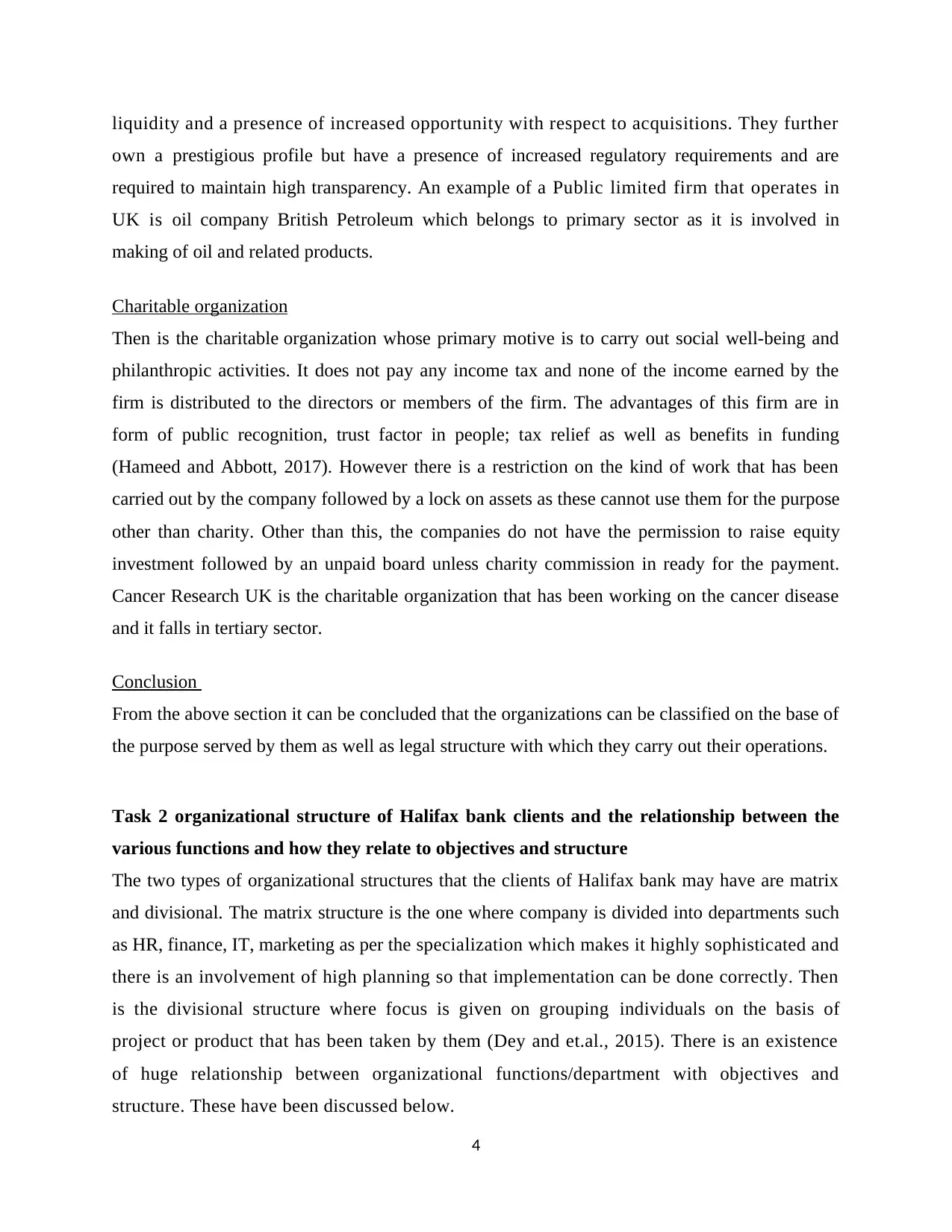
liquidity and a presence of increased opportunity with respect to acquisitions. They further
own a prestigious profile but have a presence of increased regulatory requirements and are
required to maintain high transparency. An example of a Public limited firm that operates in
UK is oil company British Petroleum which belongs to primary sector as it is involved in
making of oil and related products.
Charitable organization
Then is the charitable organization whose primary motive is to carry out social well-being and
philanthropic activities. It does not pay any income tax and none of the income earned by the
firm is distributed to the directors or members of the firm. The advantages of this firm are in
form of public recognition, trust factor in people; tax relief as well as benefits in funding
(Hameed and Abbott, 2017). However there is a restriction on the kind of work that has been
carried out by the company followed by a lock on assets as these cannot use them for the purpose
other than charity. Other than this, the companies do not have the permission to raise equity
investment followed by an unpaid board unless charity commission in ready for the payment.
Cancer Research UK is the charitable organization that has been working on the cancer disease
and it falls in tertiary sector.
Conclusion
From the above section it can be concluded that the organizations can be classified on the base of
the purpose served by them as well as legal structure with which they carry out their operations.
Task 2 organizational structure of Halifax bank clients and the relationship between the
various functions and how they relate to objectives and structure
The two types of organizational structures that the clients of Halifax bank may have are matrix
and divisional. The matrix structure is the one where company is divided into departments such
as HR, finance, IT, marketing as per the specialization which makes it highly sophisticated and
there is an involvement of high planning so that implementation can be done correctly. Then
is the divisional structure where focus is given on grouping individuals on the basis of
project or product that has been taken by them (Dey and et.al., 2015). There is an existence
of huge relationship between organizational functions/department with objectives and
structure. These have been discussed below.
4
own a prestigious profile but have a presence of increased regulatory requirements and are
required to maintain high transparency. An example of a Public limited firm that operates in
UK is oil company British Petroleum which belongs to primary sector as it is involved in
making of oil and related products.
Charitable organization
Then is the charitable organization whose primary motive is to carry out social well-being and
philanthropic activities. It does not pay any income tax and none of the income earned by the
firm is distributed to the directors or members of the firm. The advantages of this firm are in
form of public recognition, trust factor in people; tax relief as well as benefits in funding
(Hameed and Abbott, 2017). However there is a restriction on the kind of work that has been
carried out by the company followed by a lock on assets as these cannot use them for the purpose
other than charity. Other than this, the companies do not have the permission to raise equity
investment followed by an unpaid board unless charity commission in ready for the payment.
Cancer Research UK is the charitable organization that has been working on the cancer disease
and it falls in tertiary sector.
Conclusion
From the above section it can be concluded that the organizations can be classified on the base of
the purpose served by them as well as legal structure with which they carry out their operations.
Task 2 organizational structure of Halifax bank clients and the relationship between the
various functions and how they relate to objectives and structure
The two types of organizational structures that the clients of Halifax bank may have are matrix
and divisional. The matrix structure is the one where company is divided into departments such
as HR, finance, IT, marketing as per the specialization which makes it highly sophisticated and
there is an involvement of high planning so that implementation can be done correctly. Then
is the divisional structure where focus is given on grouping individuals on the basis of
project or product that has been taken by them (Dey and et.al., 2015). There is an existence
of huge relationship between organizational functions/department with objectives and
structure. These have been discussed below.
4
Paraphrase This Document
Need a fresh take? Get an instant paraphrase of this document with our AI Paraphraser
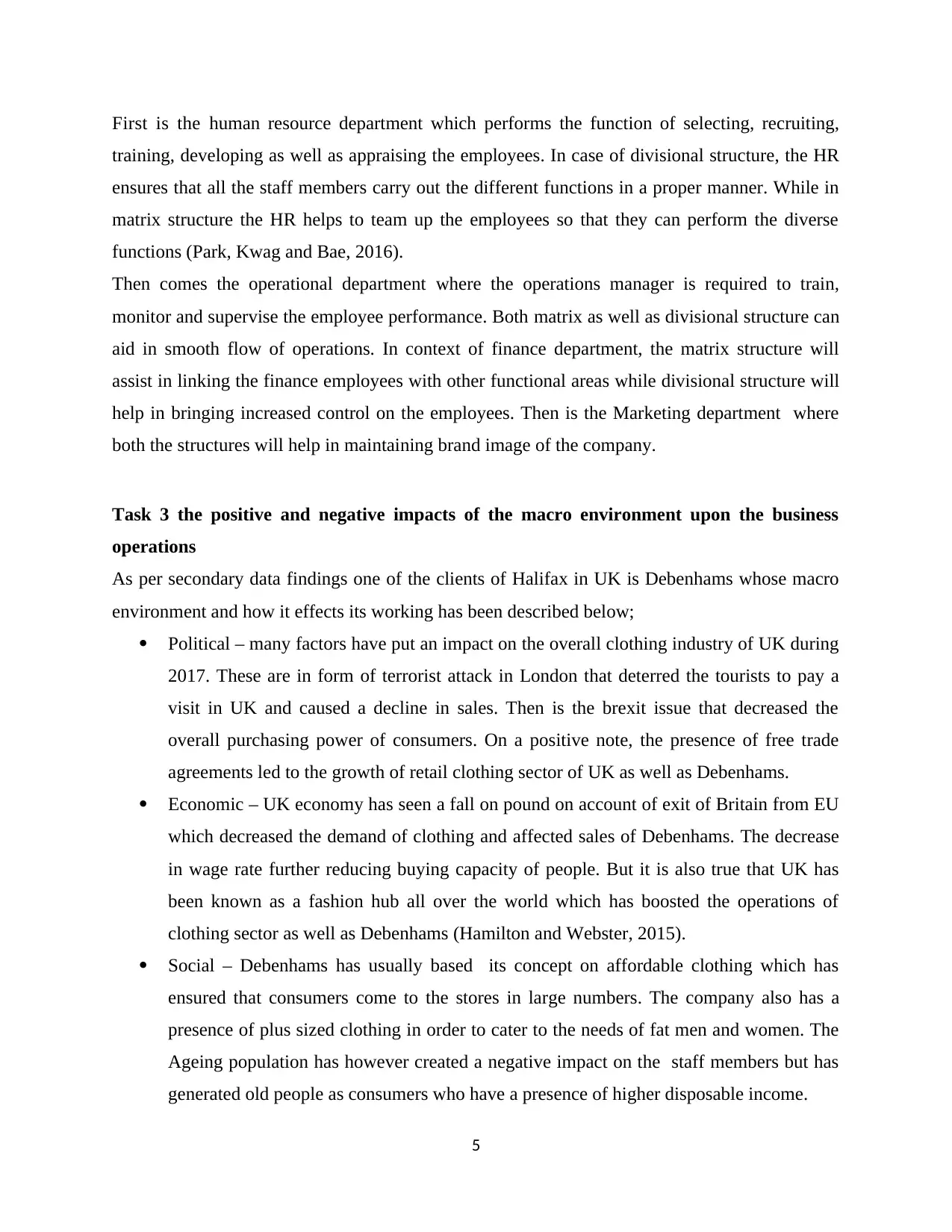
First is the human resource department which performs the function of selecting, recruiting,
training, developing as well as appraising the employees. In case of divisional structure, the HR
ensures that all the staff members carry out the different functions in a proper manner. While in
matrix structure the HR helps to team up the employees so that they can perform the diverse
functions (Park, Kwag and Bae, 2016).
Then comes the operational department where the operations manager is required to train,
monitor and supervise the employee performance. Both matrix as well as divisional structure can
aid in smooth flow of operations. In context of finance department, the matrix structure will
assist in linking the finance employees with other functional areas while divisional structure will
help in bringing increased control on the employees. Then is the Marketing department where
both the structures will help in maintaining brand image of the company.
Task 3 the positive and negative impacts of the macro environment upon the business
operations
As per secondary data findings one of the clients of Halifax in UK is Debenhams whose macro
environment and how it effects its working has been described below;
Political – many factors have put an impact on the overall clothing industry of UK during
2017. These are in form of terrorist attack in London that deterred the tourists to pay a
visit in UK and caused a decline in sales. Then is the brexit issue that decreased the
overall purchasing power of consumers. On a positive note, the presence of free trade
agreements led to the growth of retail clothing sector of UK as well as Debenhams.
Economic – UK economy has seen a fall on pound on account of exit of Britain from EU
which decreased the demand of clothing and affected sales of Debenhams. The decrease
in wage rate further reducing buying capacity of people. But it is also true that UK has
been known as a fashion hub all over the world which has boosted the operations of
clothing sector as well as Debenhams (Hamilton and Webster, 2015).
Social – Debenhams has usually based its concept on affordable clothing which has
ensured that consumers come to the stores in large numbers. The company also has a
presence of plus sized clothing in order to cater to the needs of fat men and women. The
Ageing population has however created a negative impact on the staff members but has
generated old people as consumers who have a presence of higher disposable income.
5
training, developing as well as appraising the employees. In case of divisional structure, the HR
ensures that all the staff members carry out the different functions in a proper manner. While in
matrix structure the HR helps to team up the employees so that they can perform the diverse
functions (Park, Kwag and Bae, 2016).
Then comes the operational department where the operations manager is required to train,
monitor and supervise the employee performance. Both matrix as well as divisional structure can
aid in smooth flow of operations. In context of finance department, the matrix structure will
assist in linking the finance employees with other functional areas while divisional structure will
help in bringing increased control on the employees. Then is the Marketing department where
both the structures will help in maintaining brand image of the company.
Task 3 the positive and negative impacts of the macro environment upon the business
operations
As per secondary data findings one of the clients of Halifax in UK is Debenhams whose macro
environment and how it effects its working has been described below;
Political – many factors have put an impact on the overall clothing industry of UK during
2017. These are in form of terrorist attack in London that deterred the tourists to pay a
visit in UK and caused a decline in sales. Then is the brexit issue that decreased the
overall purchasing power of consumers. On a positive note, the presence of free trade
agreements led to the growth of retail clothing sector of UK as well as Debenhams.
Economic – UK economy has seen a fall on pound on account of exit of Britain from EU
which decreased the demand of clothing and affected sales of Debenhams. The decrease
in wage rate further reducing buying capacity of people. But it is also true that UK has
been known as a fashion hub all over the world which has boosted the operations of
clothing sector as well as Debenhams (Hamilton and Webster, 2015).
Social – Debenhams has usually based its concept on affordable clothing which has
ensured that consumers come to the stores in large numbers. The company also has a
presence of plus sized clothing in order to cater to the needs of fat men and women. The
Ageing population has however created a negative impact on the staff members but has
generated old people as consumers who have a presence of higher disposable income.
5
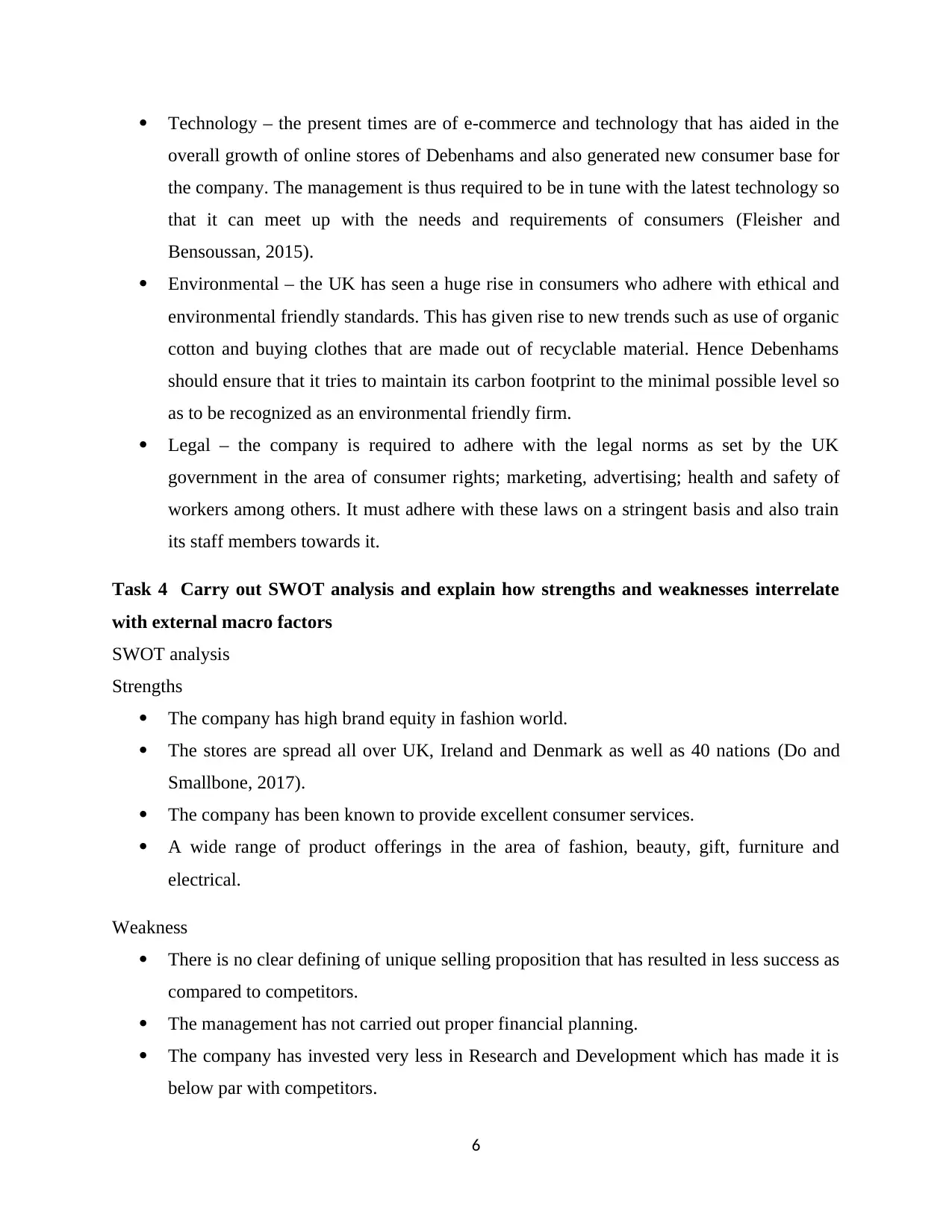
Technology – the present times are of e-commerce and technology that has aided in the
overall growth of online stores of Debenhams and also generated new consumer base for
the company. The management is thus required to be in tune with the latest technology so
that it can meet up with the needs and requirements of consumers (Fleisher and
Bensoussan, 2015).
Environmental – the UK has seen a huge rise in consumers who adhere with ethical and
environmental friendly standards. This has given rise to new trends such as use of organic
cotton and buying clothes that are made out of recyclable material. Hence Debenhams
should ensure that it tries to maintain its carbon footprint to the minimal possible level so
as to be recognized as an environmental friendly firm.
Legal – the company is required to adhere with the legal norms as set by the UK
government in the area of consumer rights; marketing, advertising; health and safety of
workers among others. It must adhere with these laws on a stringent basis and also train
its staff members towards it.
Task 4 Carry out SWOT analysis and explain how strengths and weaknesses interrelate
with external macro factors
SWOT analysis
Strengths
The company has high brand equity in fashion world.
The stores are spread all over UK, Ireland and Denmark as well as 40 nations (Do and
Smallbone, 2017).
The company has been known to provide excellent consumer services.
A wide range of product offerings in the area of fashion, beauty, gift, furniture and
electrical.
Weakness
There is no clear defining of unique selling proposition that has resulted in less success as
compared to competitors.
The management has not carried out proper financial planning.
The company has invested very less in Research and Development which has made it is
below par with competitors.
6
overall growth of online stores of Debenhams and also generated new consumer base for
the company. The management is thus required to be in tune with the latest technology so
that it can meet up with the needs and requirements of consumers (Fleisher and
Bensoussan, 2015).
Environmental – the UK has seen a huge rise in consumers who adhere with ethical and
environmental friendly standards. This has given rise to new trends such as use of organic
cotton and buying clothes that are made out of recyclable material. Hence Debenhams
should ensure that it tries to maintain its carbon footprint to the minimal possible level so
as to be recognized as an environmental friendly firm.
Legal – the company is required to adhere with the legal norms as set by the UK
government in the area of consumer rights; marketing, advertising; health and safety of
workers among others. It must adhere with these laws on a stringent basis and also train
its staff members towards it.
Task 4 Carry out SWOT analysis and explain how strengths and weaknesses interrelate
with external macro factors
SWOT analysis
Strengths
The company has high brand equity in fashion world.
The stores are spread all over UK, Ireland and Denmark as well as 40 nations (Do and
Smallbone, 2017).
The company has been known to provide excellent consumer services.
A wide range of product offerings in the area of fashion, beauty, gift, furniture and
electrical.
Weakness
There is no clear defining of unique selling proposition that has resulted in less success as
compared to competitors.
The management has not carried out proper financial planning.
The company has invested very less in Research and Development which has made it is
below par with competitors.
6
⊘ This is a preview!⊘
Do you want full access?
Subscribe today to unlock all pages.

Trusted by 1+ million students worldwide
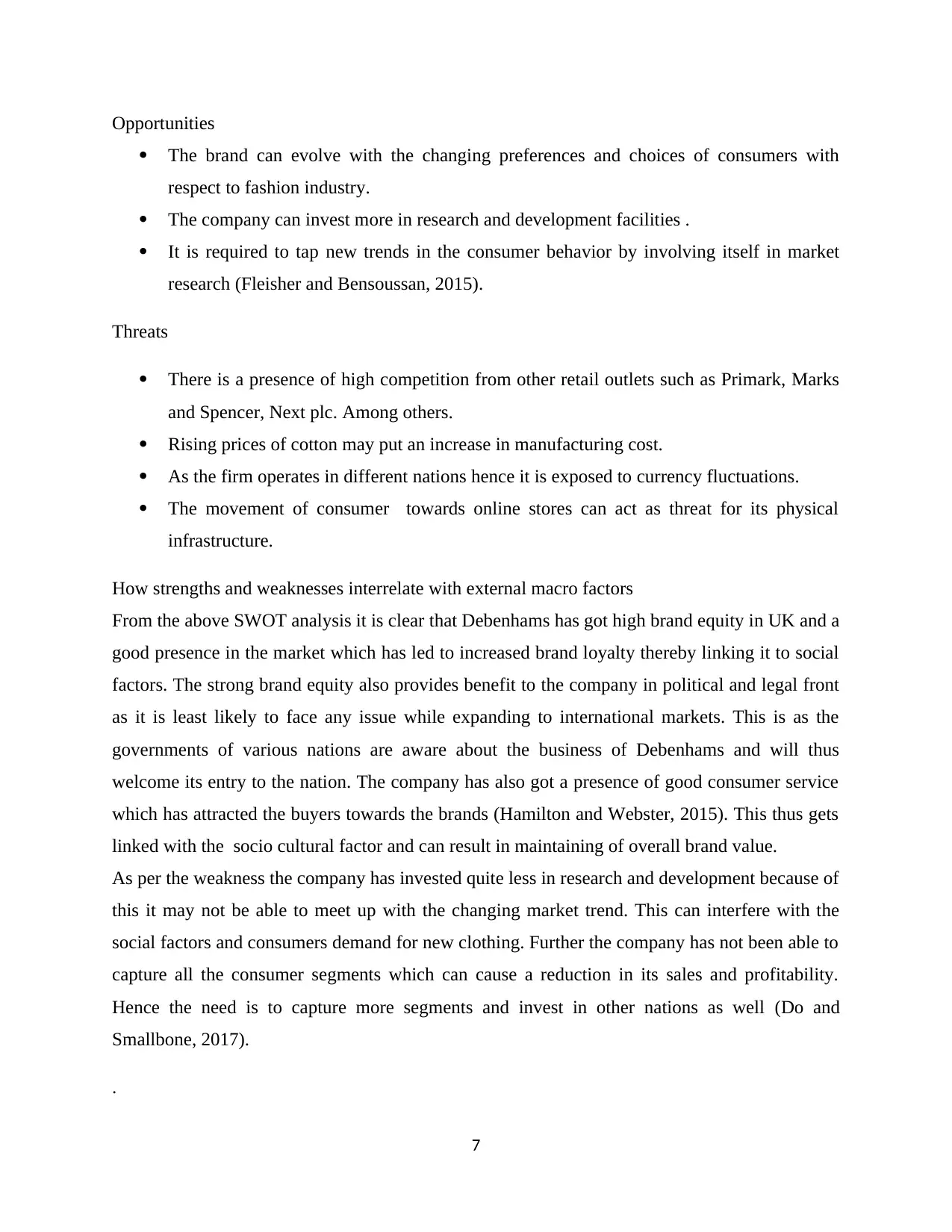
Opportunities
The brand can evolve with the changing preferences and choices of consumers with
respect to fashion industry.
The company can invest more in research and development facilities .
It is required to tap new trends in the consumer behavior by involving itself in market
research (Fleisher and Bensoussan, 2015).
Threats
There is a presence of high competition from other retail outlets such as Primark, Marks
and Spencer, Next plc. Among others.
Rising prices of cotton may put an increase in manufacturing cost.
As the firm operates in different nations hence it is exposed to currency fluctuations.
The movement of consumer towards online stores can act as threat for its physical
infrastructure.
How strengths and weaknesses interrelate with external macro factors
From the above SWOT analysis it is clear that Debenhams has got high brand equity in UK and a
good presence in the market which has led to increased brand loyalty thereby linking it to social
factors. The strong brand equity also provides benefit to the company in political and legal front
as it is least likely to face any issue while expanding to international markets. This is as the
governments of various nations are aware about the business of Debenhams and will thus
welcome its entry to the nation. The company has also got a presence of good consumer service
which has attracted the buyers towards the brands (Hamilton and Webster, 2015). This thus gets
linked with the socio cultural factor and can result in maintaining of overall brand value.
As per the weakness the company has invested quite less in research and development because of
this it may not be able to meet up with the changing market trend. This can interfere with the
social factors and consumers demand for new clothing. Further the company has not been able to
capture all the consumer segments which can cause a reduction in its sales and profitability.
Hence the need is to capture more segments and invest in other nations as well (Do and
Smallbone, 2017).
.
7
The brand can evolve with the changing preferences and choices of consumers with
respect to fashion industry.
The company can invest more in research and development facilities .
It is required to tap new trends in the consumer behavior by involving itself in market
research (Fleisher and Bensoussan, 2015).
Threats
There is a presence of high competition from other retail outlets such as Primark, Marks
and Spencer, Next plc. Among others.
Rising prices of cotton may put an increase in manufacturing cost.
As the firm operates in different nations hence it is exposed to currency fluctuations.
The movement of consumer towards online stores can act as threat for its physical
infrastructure.
How strengths and weaknesses interrelate with external macro factors
From the above SWOT analysis it is clear that Debenhams has got high brand equity in UK and a
good presence in the market which has led to increased brand loyalty thereby linking it to social
factors. The strong brand equity also provides benefit to the company in political and legal front
as it is least likely to face any issue while expanding to international markets. This is as the
governments of various nations are aware about the business of Debenhams and will thus
welcome its entry to the nation. The company has also got a presence of good consumer service
which has attracted the buyers towards the brands (Hamilton and Webster, 2015). This thus gets
linked with the socio cultural factor and can result in maintaining of overall brand value.
As per the weakness the company has invested quite less in research and development because of
this it may not be able to meet up with the changing market trend. This can interfere with the
social factors and consumers demand for new clothing. Further the company has not been able to
capture all the consumer segments which can cause a reduction in its sales and profitability.
Hence the need is to capture more segments and invest in other nations as well (Do and
Smallbone, 2017).
.
7
Paraphrase This Document
Need a fresh take? Get an instant paraphrase of this document with our AI Paraphraser
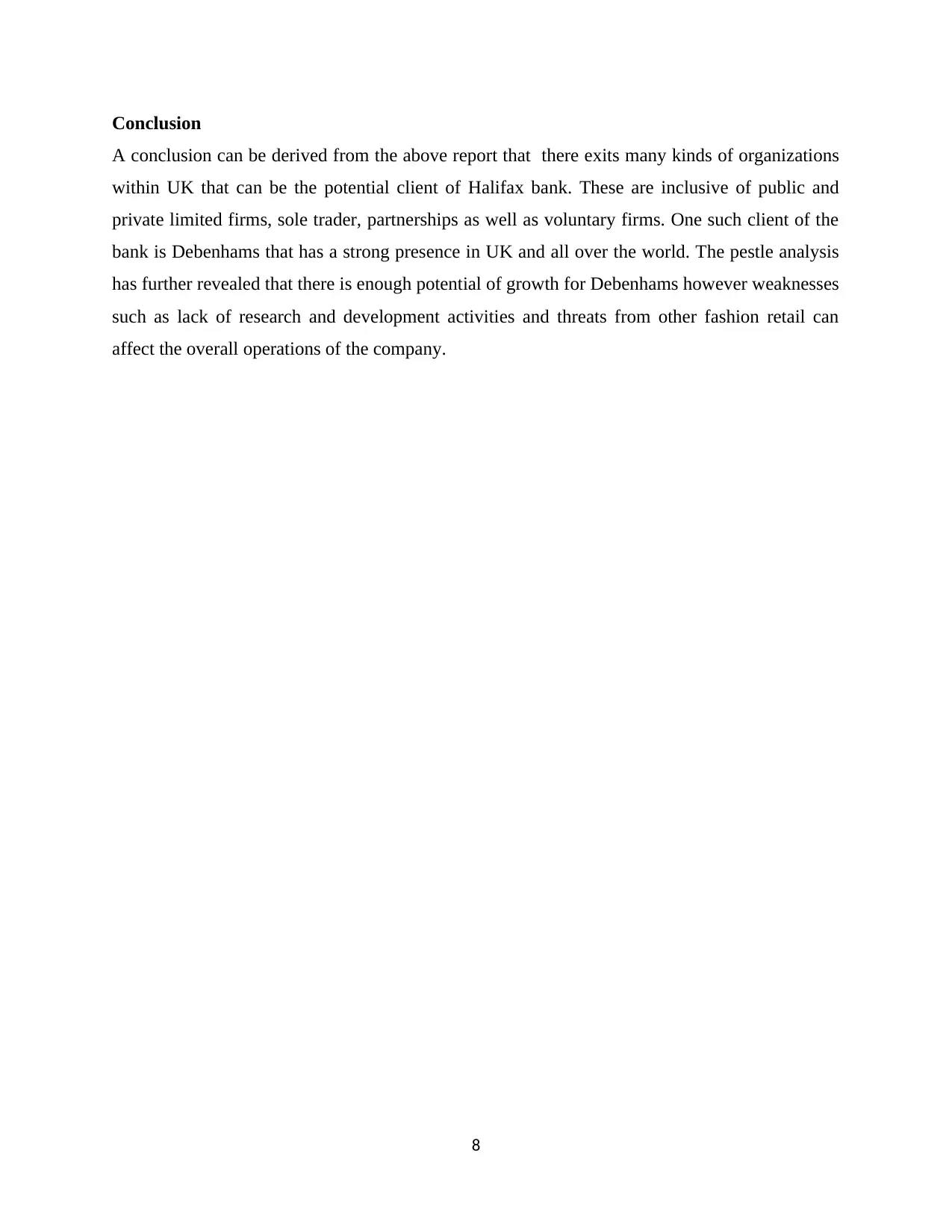
Conclusion
A conclusion can be derived from the above report that there exits many kinds of organizations
within UK that can be the potential client of Halifax bank. These are inclusive of public and
private limited firms, sole trader, partnerships as well as voluntary firms. One such client of the
bank is Debenhams that has a strong presence in UK and all over the world. The pestle analysis
has further revealed that there is enough potential of growth for Debenhams however weaknesses
such as lack of research and development activities and threats from other fashion retail can
affect the overall operations of the company.
8
A conclusion can be derived from the above report that there exits many kinds of organizations
within UK that can be the potential client of Halifax bank. These are inclusive of public and
private limited firms, sole trader, partnerships as well as voluntary firms. One such client of the
bank is Debenhams that has a strong presence in UK and all over the world. The pestle analysis
has further revealed that there is enough potential of growth for Debenhams however weaknesses
such as lack of research and development activities and threats from other fashion retail can
affect the overall operations of the company.
8
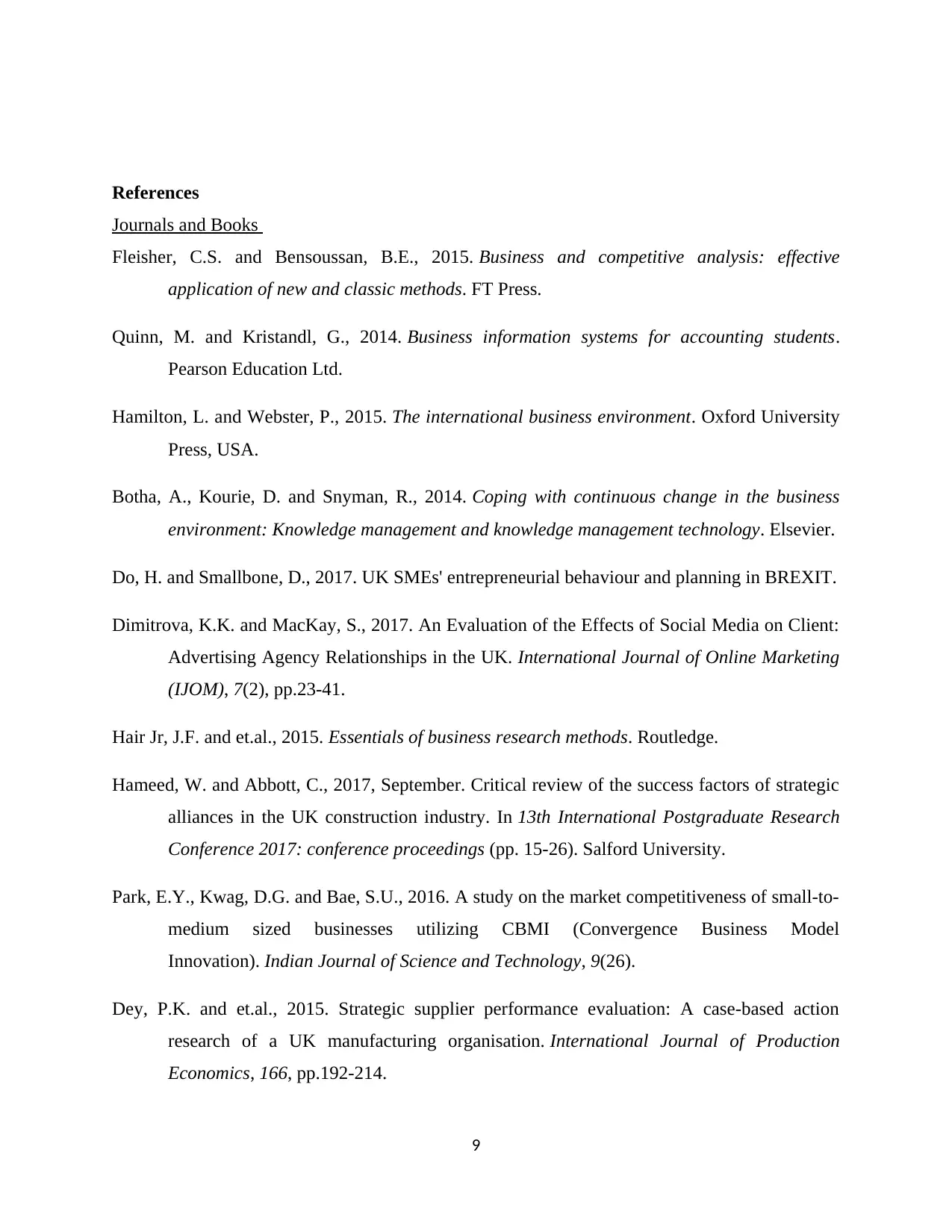
References
Journals and Books
Fleisher, C.S. and Bensoussan, B.E., 2015. Business and competitive analysis: effective
application of new and classic methods. FT Press.
Quinn, M. and Kristandl, G., 2014. Business information systems for accounting students.
Pearson Education Ltd.
Hamilton, L. and Webster, P., 2015. The international business environment. Oxford University
Press, USA.
Botha, A., Kourie, D. and Snyman, R., 2014. Coping with continuous change in the business
environment: Knowledge management and knowledge management technology. Elsevier.
Do, H. and Smallbone, D., 2017. UK SMEs' entrepreneurial behaviour and planning in BREXIT.
Dimitrova, K.K. and MacKay, S., 2017. An Evaluation of the Effects of Social Media on Client:
Advertising Agency Relationships in the UK. International Journal of Online Marketing
(IJOM), 7(2), pp.23-41.
Hair Jr, J.F. and et.al., 2015. Essentials of business research methods. Routledge.
Hameed, W. and Abbott, C., 2017, September. Critical review of the success factors of strategic
alliances in the UK construction industry. In 13th International Postgraduate Research
Conference 2017: conference proceedings (pp. 15-26). Salford University.
Park, E.Y., Kwag, D.G. and Bae, S.U., 2016. A study on the market competitiveness of small-to-
medium sized businesses utilizing CBMI (Convergence Business Model
Innovation). Indian Journal of Science and Technology, 9(26).
Dey, P.K. and et.al., 2015. Strategic supplier performance evaluation: A case-based action
research of a UK manufacturing organisation. International Journal of Production
Economics, 166, pp.192-214.
9
Journals and Books
Fleisher, C.S. and Bensoussan, B.E., 2015. Business and competitive analysis: effective
application of new and classic methods. FT Press.
Quinn, M. and Kristandl, G., 2014. Business information systems for accounting students.
Pearson Education Ltd.
Hamilton, L. and Webster, P., 2015. The international business environment. Oxford University
Press, USA.
Botha, A., Kourie, D. and Snyman, R., 2014. Coping with continuous change in the business
environment: Knowledge management and knowledge management technology. Elsevier.
Do, H. and Smallbone, D., 2017. UK SMEs' entrepreneurial behaviour and planning in BREXIT.
Dimitrova, K.K. and MacKay, S., 2017. An Evaluation of the Effects of Social Media on Client:
Advertising Agency Relationships in the UK. International Journal of Online Marketing
(IJOM), 7(2), pp.23-41.
Hair Jr, J.F. and et.al., 2015. Essentials of business research methods. Routledge.
Hameed, W. and Abbott, C., 2017, September. Critical review of the success factors of strategic
alliances in the UK construction industry. In 13th International Postgraduate Research
Conference 2017: conference proceedings (pp. 15-26). Salford University.
Park, E.Y., Kwag, D.G. and Bae, S.U., 2016. A study on the market competitiveness of small-to-
medium sized businesses utilizing CBMI (Convergence Business Model
Innovation). Indian Journal of Science and Technology, 9(26).
Dey, P.K. and et.al., 2015. Strategic supplier performance evaluation: A case-based action
research of a UK manufacturing organisation. International Journal of Production
Economics, 166, pp.192-214.
9
⊘ This is a preview!⊘
Do you want full access?
Subscribe today to unlock all pages.

Trusted by 1+ million students worldwide
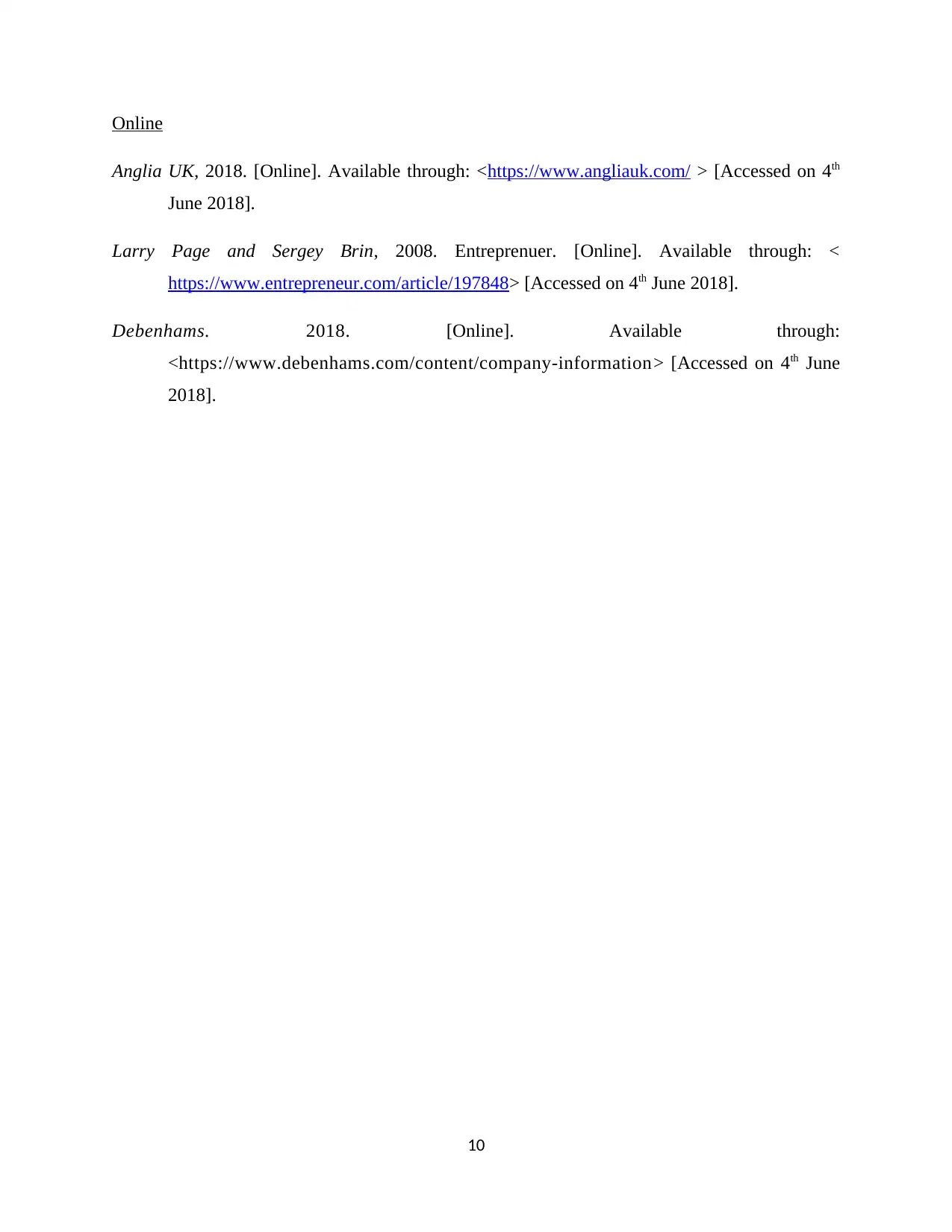
Online
Anglia UK, 2018. [Online]. Available through: <https://www.angliauk.com/ > [Accessed on 4th
June 2018].
Larry Page and Sergey Brin, 2008. Entreprenuer. [Online]. Available through: <
https://www.entrepreneur.com/article/197848> [Accessed on 4th June 2018].
Debenhams. 2018. [Online]. Available through:
<https://www.debenhams.com/content/company-information> [Accessed on 4th June
2018].
10
Anglia UK, 2018. [Online]. Available through: <https://www.angliauk.com/ > [Accessed on 4th
June 2018].
Larry Page and Sergey Brin, 2008. Entreprenuer. [Online]. Available through: <
https://www.entrepreneur.com/article/197848> [Accessed on 4th June 2018].
Debenhams. 2018. [Online]. Available through:
<https://www.debenhams.com/content/company-information> [Accessed on 4th June
2018].
10
1 out of 10
Related Documents
Your All-in-One AI-Powered Toolkit for Academic Success.
+13062052269
info@desklib.com
Available 24*7 on WhatsApp / Email
![[object Object]](/_next/static/media/star-bottom.7253800d.svg)
Unlock your academic potential
Copyright © 2020–2026 A2Z Services. All Rights Reserved. Developed and managed by ZUCOL.





